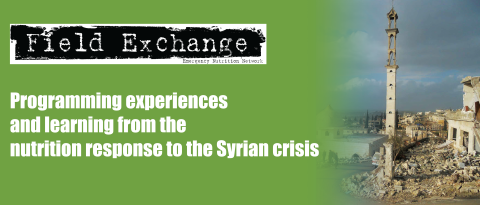Infant and young child feeding support in Lebanon: strengthening the national system
By Pressila Darjani and Linda Shaker Berbari
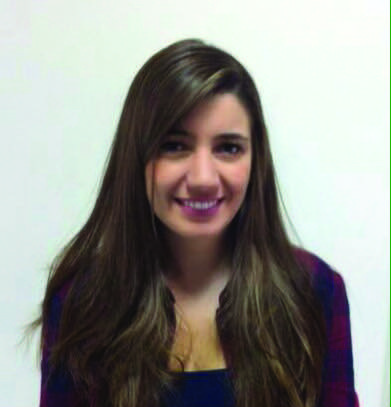 Pressila Derjany is the Infant and Young Child Coordinator at IOCC. She has a B.Sc. in Nutrition and Dietetics. She joined IOCC in December 2013.
Pressila Derjany is the Infant and Young Child Coordinator at IOCC. She has a B.Sc. in Nutrition and Dietetics. She joined IOCC in December 2013.
Linda Shaker Berbari is Country Representative at International Orthodox Christian Charities (IOCC) Lebanon and nutrition focal point for IOCC. She holds a Masters in Nutrition and is pursuing a PhD on infant and young child feeding in emergencies.
The authors gratefully acknowledge the support of UNICEF and UNHCR for funding training and salaries of staff, the MoPH for supporting and facilitating the establishment of the programme and the National Programme on IYCF for hosting the activities.
The policy and social context
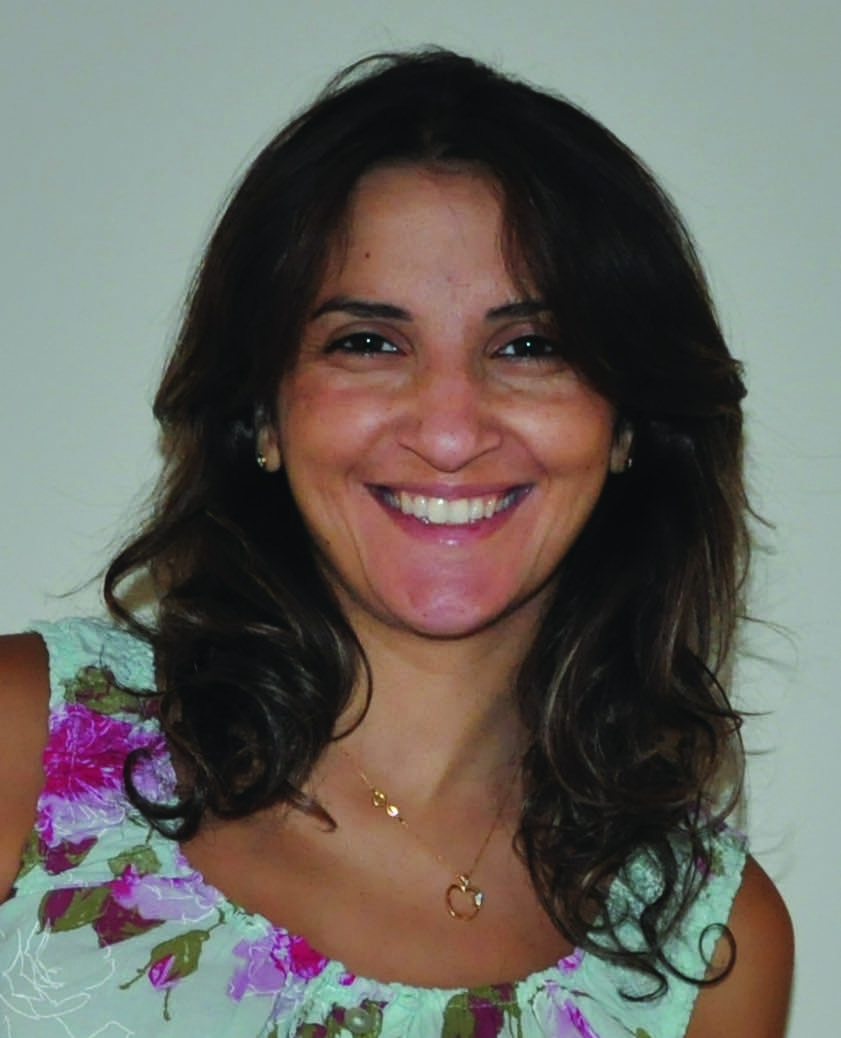 In 2011, the International Orthodox Christian Charities (IOCC) launched the Preparing for the Next Generation Initiative that builds on the importance of the first 1000 days of an infant’s life. Through this initiative, IOCC is working to create a strong national mother and child nutrition programme that will not only prepare the nation against any emergency but also improve the wellbeing of Lebanese children for generations to come. IOCCs programming on infant and young child feeding in Lebanon is located within this initiative. This article describes IOCCs role in a recently established national programme to strengthen policy guidance and support around IYCF-E in health services in Lebanon, including additional activities that were developed to respond to the Syria crisis.
In 2011, the International Orthodox Christian Charities (IOCC) launched the Preparing for the Next Generation Initiative that builds on the importance of the first 1000 days of an infant’s life. Through this initiative, IOCC is working to create a strong national mother and child nutrition programme that will not only prepare the nation against any emergency but also improve the wellbeing of Lebanese children for generations to come. IOCCs programming on infant and young child feeding in Lebanon is located within this initiative. This article describes IOCCs role in a recently established national programme to strengthen policy guidance and support around IYCF-E in health services in Lebanon, including additional activities that were developed to respond to the Syria crisis.
In Lebanon, the only government regulation on infant feeding was a 1983 law related to the ‘Marketing of Breastmilk Substitutes’. However, an updated version was issued in 2008 (Law 47/2008) that is currently considered even stricter than the International Code of Marketing of Breastmilk Substitutes (BMS) (the Code). Unfortunately, although efforts are being put in place to enforce this law, there is evidence that health workers and even government representatives are not aware of it. It is also evident that much more is needed in order to identify potentially available guidelines so that these can be included within a reliable policy framework. In the absence of effective government policies, the private sector and non-governmental organisation (NGO) sector in Lebanon play a large role in influencing the type of service provided. The only available study, conducted by Save the Children after the latest Lebanese war in July 2006, showed some key findings around policy and infant and young child feeding practices:
- A lack of awareness amongst NGOs, the government and health workers about the Operational Guidance on IYCF-E and the Code
- A large number of Code violations, including inappropriate distribution of infant formula
- Most intervening agencies - including international NGOs and United Nations (UN) agencies - did not ensure their partners followed Ops Guidance on IYCF-E
- Mothers were not adequately supported to continue breastfeeding
- Infant feeding was not a priority.
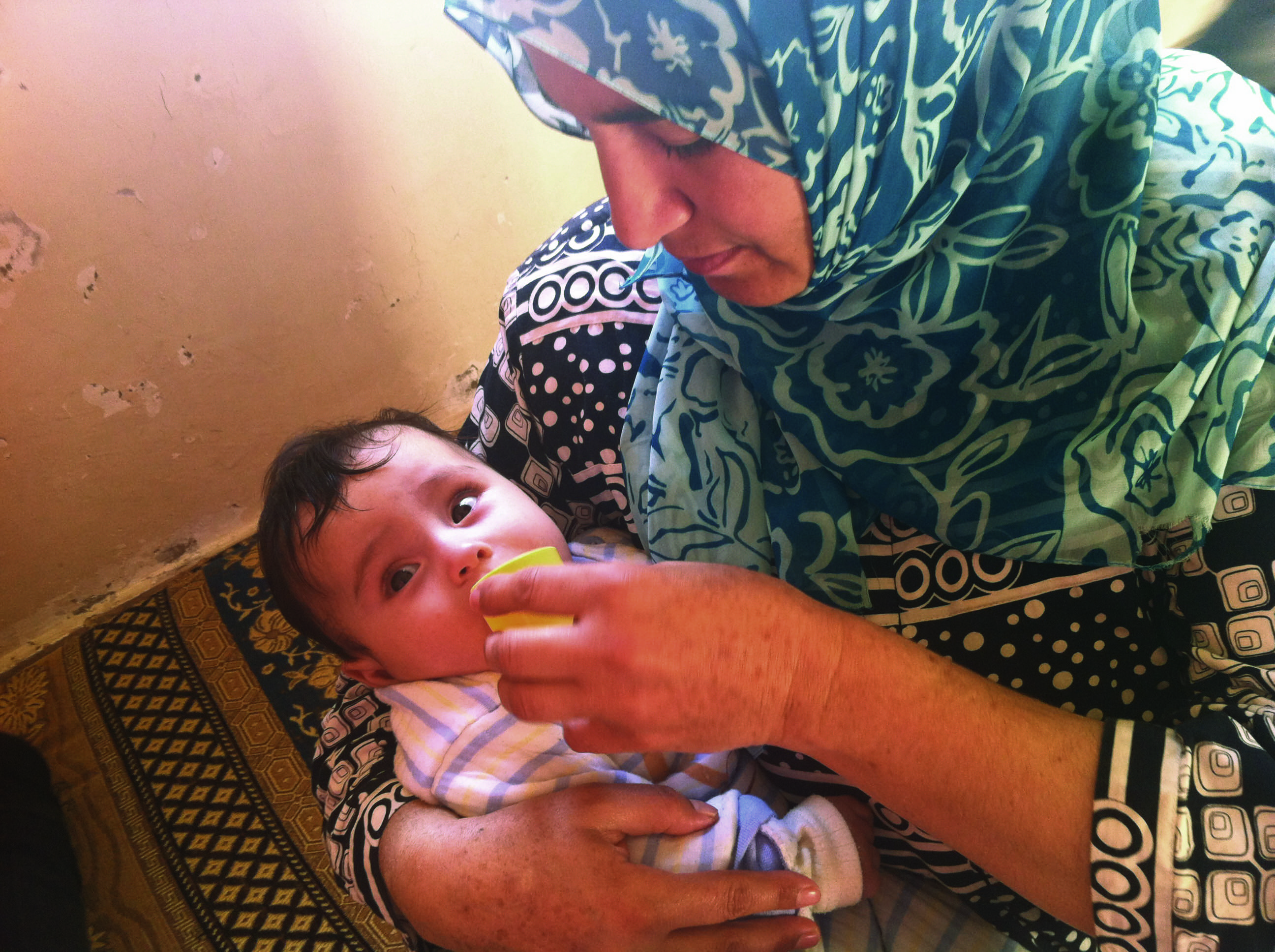 These factors had a negative impact on prevalence of breastfeeding and proper infant nutrition1. In addition, eight years after this July 2006 war, reports from INGOs currently intervening in Lebanon in response to the high influx of Syrian refugees as a result of the Syrian crisis, show that there are still a large number of Code violations and that infant feeding is not on the priority list of interventions. Hospitals are still distributing infant formula and paediatricians continue to inappropriately prescribe it to mothers.
These factors had a negative impact on prevalence of breastfeeding and proper infant nutrition1. In addition, eight years after this July 2006 war, reports from INGOs currently intervening in Lebanon in response to the high influx of Syrian refugees as a result of the Syrian crisis, show that there are still a large number of Code violations and that infant feeding is not on the priority list of interventions. Hospitals are still distributing infant formula and paediatricians continue to inappropriately prescribe it to mothers.
The prevalence of exclusive breastfeeding is currently low in Lebanon, with only 14.8% of infants 0-5 months of age exclusively breastfed (MICS, 2009). Rates of childhood2 and adult obesity, hypertension and high cholesterol3 in Lebanon are comparable to those in the United States. The prominent misconceptions, lack of proper supportive environment, and the heavy marketing of artificial feeding4 all contribute to the low rate of breastfeeding in addition to the absence of a global and solid policy framework in the area of infant and child feeding.
In order to address this, since 2011, IOCC has partnered with World Vision, the Ministry of Public Health (MOPH) and other local institutions including the Lebanese Association for Early Children Development. A National Programme on IYCF was established at the MOPH with support from IOCC and World Vision. IOCC works through this programme in order to execute activities that support IYCF, such as celebrations for the annual World Breastfeeding Week, media campaigns and other promotional activities. Within the National Programme, a sub-committee was created in 2011, mainly supported by IOCC, focusing on IYCF-E.
Response on IYCF-E to the current crisis
In 2012, with UNICEF funding, IOCC implemented a programme to support upholding the Code during the Syria crisis in Lebanon. Workshops were implemented targeting NGOs and agencies responding to the Syria crisis. In addition, the publication of a joint statement was facilitated and endorsed5. Since August 2013, IOCC with support from UNICEF and UNHCR, has been implementing a programme to support, promote and protect IYCF amongst both the refugee and host populations affected by the Syria crisis in Lebanon. The programme includes the following activities which endeavour to promote three objectives:
1. Promotion of optimal IYCF practices
Education and awareness activities on optimal IYCF are administered at the primary health centres (PHCs), in hospitals and at the community level. To-date, IOCC has targeted more than 10,000 mothers with awareness on IYCF. Educational material were developed and tailored to the Middle Eastern context. The UNICEF Infant Feeding counselling cards were translated, tested, and adapted. Staff at health care centres were trained on the use of the counselling cards (see Figure 1 for a sample card).
Figure 1: Sample IYCF counselling card
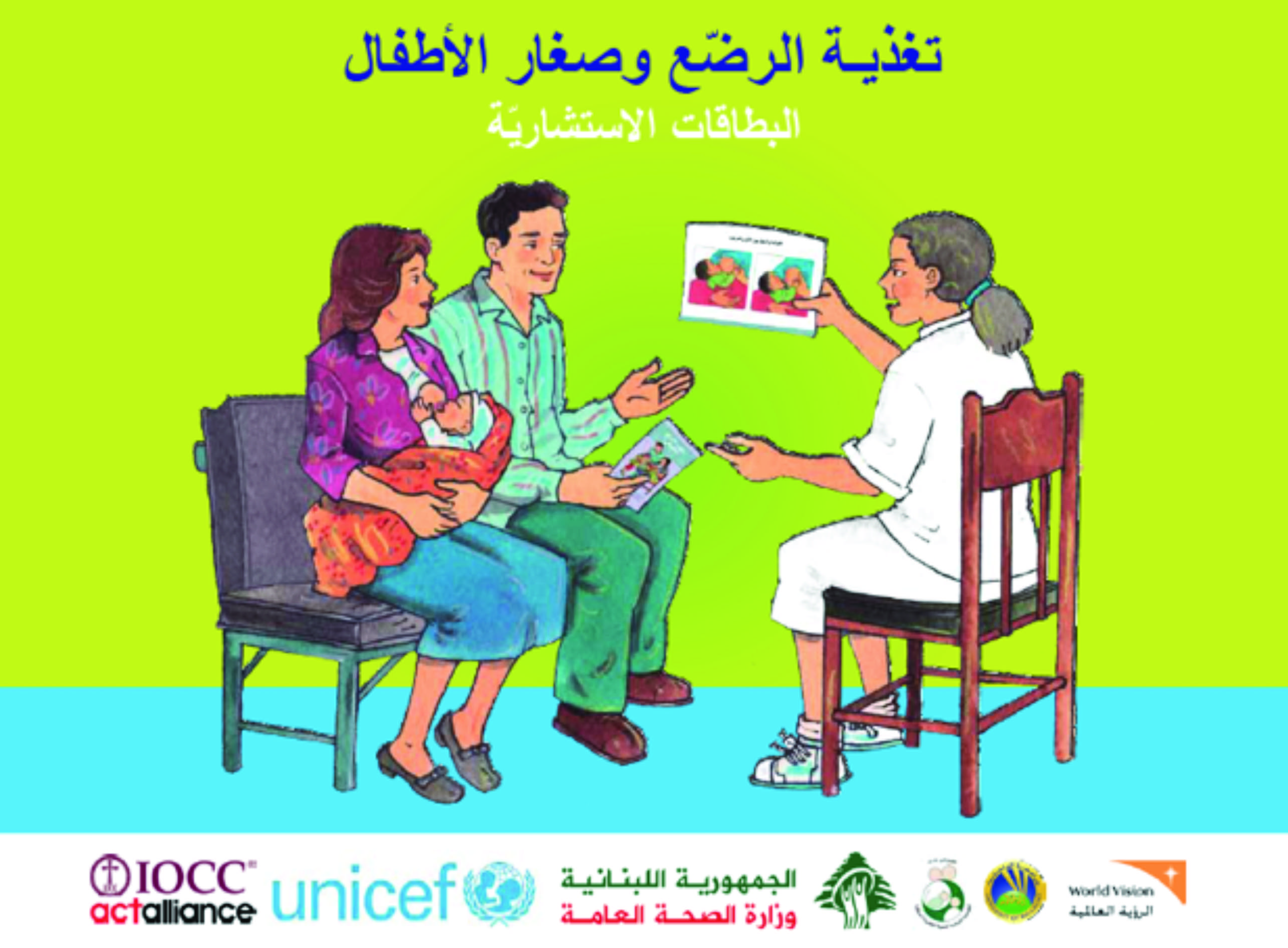
2. Supporting mothers to ensure optimal IYCF
Mothers receive IYCF counselling during and after delivery (see case study for one woman’s experience). The service is provided at the hospital, PHC and community levels. In contracted hospitals, IOCC lactation specialists are present to ensure early initiation of breastfeeding, as well as correct positioning for feeding, etc. Follow up is provided in the community as necessary. Also, through community outreach, mothers are identified and are referred by other NGOs to the lactation support service. Typically, lactation specialists counsel mothers of infants under 6 months of age who are not exclusively breastfed. Mothers are helped to re-establish milk supply and exclusively breastfeed. In most cases, this intervention is successful.
Mothers who have not breastfeed at all or have stopped breastfeeding are counselled on relactation and helped to re-establish milk supply if they so choose. In most cases, the intervention is successful, which depends greatly on the dedication and commitment of the mother. There are instances when relactation is not possible, for example, when the mother is not willing, or the child is old and not able to latch on, or the child/mother has health problems. In these cases, mothers are referred for artificial feeding support (see below) where they are provided with BMS supplies, and guidance and education on proper use. About 30% of the cases choose not to or cannot breastfeed.
Since January 2014 till end of June 2014, 3,150 mothers were counselled by lactation specialists in all the Lebanese regions, assisting mothers with breastfeeding difficulties, such as painful nursing, latching problems and low breastmilk production.
All children under 2 years are considered equally viable for re-lactation, but the under 6 months age group are given priority. Lactation specialists also work with the nutritionist to counsel the mother on optimal complementary feeding practices. This service is available in hospitals and in the community. There are cases of infants over 6 months of age who have not been introduced to complementary foods and are still exclusively breastfed or exclusively bottle fed. This negatively impacts the child’s nutritional status.
IOCC, as part of the IYCF National Programme, has trained more than 200 health care staff within PHCs and hospitals to provide infant feeding support and increase awareness of mothers. This has increased the pool of available qualified lactation specialist to support breastfeeding. Training material, including the WHO 20-hour and 40-hour lactation courses, were adapted and used in collaboration with the National Programme on IYCF. Working within PHCs, IOCC is helping create mother friendly spaces where mothers can meet and share their experiences. The spaces are used to conduct sessions targeting mothers with children under 2 years of age.
Case study: Supporting Syrian refugee mothers who choose to breastfeed.
By Tiziana Cauli and Rana Hage, IOCC Lebanon
Aamer is 3 months old. He lives in the tented Syrian refugee settlement of Khaled el Homsi, near the town of Saadnayel, in Lebanon’s Bekaa valley, with his mother Mufida Al Hamsi and his 18-month old brother Jassem. Mufida did not breastfeed her first child and was not planning to breastfeed baby Aamer, until she was approached by IOCC lactation specialist, Zeinab Hillani. Briefed on the benefits of breastfeeding, she decided to defy the widespread misconception, common among refugee mothers in the area, that formula milk-fed babies are healthier than breastfed ones, especially in times of uncertainties and emergencies. As a result, baby Aamer is healthy and big enough for his age. “He is heavier than his brother was at 3 months,” Mufida says. “And he is healthier. Jassem suffered from gastroenteritis while he was fed with infant formula and he was always sick. He still has digestion problems.”
The 27 year old mother from Aleppo says that breastfeeding her child has also helped her financially. Her husband is missing in Syria and she has no money to buy formula milk, she says. “It’s too expensive and I can’t afford it. And I am convinced my baby will benefit from breastfeeding.”
When she first met Hillani, Mufida didn’t know how to breastfeed. She had fed her first child with infant formula and had been advised against breastfeeding her newborn baby because she had recently been sick with measles. She was approached by Hillani at the hospital, right after giving birth and started breastfeeding her baby within a few days.
“I wish I had met Zeinab beforehand,” Mufida says.
Many mothers like Mufida and their babies are victims of misconceptions. “At the paediatric ward, I speak to mothers and ask them why they are giving infant formula to their babies,” says Hillani. “Some of them refuse to breastfeed because they think or are told that infant formula is healthier. This is not true.”
“I give her vitamins and support and I am going to give her the food she needs to add to her baby’s diet after his first six months,” Hillani says. “And they gave me this,” Mufida says proudly, pointing at the baby romper suit Aamer is wearing.
The vitamins Hillani mentioned are part of the support given by IOCC to lactating mothers. Micronutrients are given to those who are not receiving them from other healthcare institutions. When babies reach 6 months of age, IOCC helps mothers integrate their children’s diet by providing them with the proper food, when necessary.
In addition, lactating mothers within IOCC programme receive a kit with clothes and other items for their babies and a personal hygiene kit for themselves as a form of encouragement6.
3. Protecting IYCF through upholding of the Code and Law 47/2008
As mentioned above, Lebanon has a history of Code violations, in both ‘normal’ and emergency situations. In many instances during crisis, NGOs accept donations of infant formula and then distribute through a general distribution. These mostly happen during special events such as periods of holidays (Eid el Fitr and Christmas). In order to mitigate such practices and prevent the flooding of Lebanon with donations and inevitable Code violations, as experienced in 2006, NGOs intervening within the Syria Crisis were targeted by IOCC. Workshops to ensure compliance with the Code and Law 47/2008 were conducted for NGOs and local partners including health care staff. In addition, a reporting mechanism was put in place to report on Code violations. Within hospitals, the Baby Friendly Hospital Initiative (BFHI) was supported through trainings and capacity building, especially in hospitals that have been contracted to provide services for Syrian refugees. As mentioned above, most hospitals in Lebanon distribute infant formula for new mothers and are not supportive of breastfeeding. In many cases, mothers are wrongly advised to provide formula for their infants based on lack of knowledge. To address this, IOCC worked on prioritising hospitals that are providing services to Syrian refugees in order to mitigate practices that may jeopardise breastfeeding. Hospitals are also provided with essential equipment and tools to support the initiative.
Artificial feeding support
Mothers are first and foremost counselled on the importance of breastfeeding, especially in the the current crisis context. If still a mother is not willing to relactate, she is provided with support on artificial feeding. Although not a large component of the programme, IOCC has also supported interventions to manage artificial feeding amongst Syrian refugees. Instances where this is necessary include when a mother is not able to breastfeeding and where an infant’s mother is not present. Another situation is where an infant has a congenital disease that contraindicates breastfeeding.
In non-medical cases, the lactation consultant makes the decision to prescribe a BMS (infant formula) suitable for the infant. IOCC staff work with the family to provide education on proper use of infant formula including hygiene practices. Cups and clean water is also provided. The mother is provided with infant formula on a monthly basis. Supplies are purchased from the market by IOCC, then unbranded (the brand is hidden with a label so only the Arabic instructions are visible) and provided to the family. One main challenge that is often encountered relates to sustaining the infant formula supply. Ideally, the infant is provided with infant formula until 1 year of age, however, in some cases, funding is not adequate to continue over this period. Staff are faced with either purchasing a supply of milk with IOCC funds (when available) until the infant is 1 year of age or stopping the assistance. The number of infants assisted with artificial feeding support by IOCC does not exceed 50 children.
Programming challenges
The main challenge around IYCF resides in addressing strongly established misconceptions around breastfeeding and the fact that many women are used to mixed feeding. Many women believe that their breastmilk is not enough and therefore resort to supplementing with infant formula. Others are influenced by the doctor’s prescription of infant formula. Some believe that breastmilk production is highly affected by the stressful situation they are experiencing. As a result, mothers mixed feed or fully artificially feed.
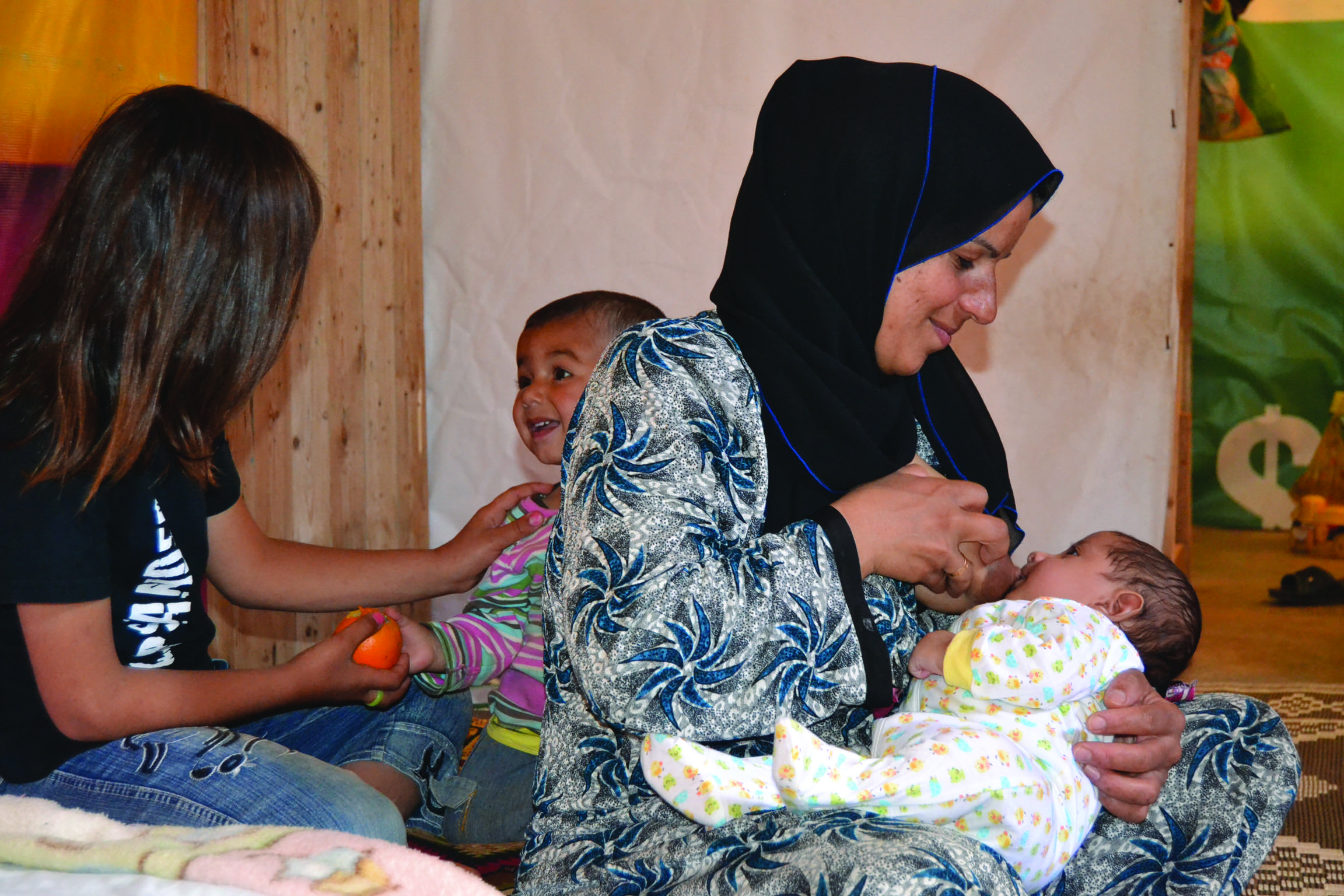 Another challenge relates to artificial feeding support and the fact that this assistance is considered a benefit. As previously mentioned, support for artificial feeding is provided by IOCC to non-breastfed infants within the Syria crisis according to the protocol and only when re-lactation is not possible. Non-breastfed infants are supplied with formula milk, clean water and cups until of year of age. It is a major challenge for IOCC to provide and maintain a supply of infant formula to 1 year of age. When refugees find out that a neighbouring family is supplied with infant formula, they often come up with ways to benefit from this assistance, even if the mother is breastfeeding with no difficulties. Here, the lactation specialist intervenes by educating families about benefits of breastfeeding versus risks of artificial feeding.
Another challenge relates to artificial feeding support and the fact that this assistance is considered a benefit. As previously mentioned, support for artificial feeding is provided by IOCC to non-breastfed infants within the Syria crisis according to the protocol and only when re-lactation is not possible. Non-breastfed infants are supplied with formula milk, clean water and cups until of year of age. It is a major challenge for IOCC to provide and maintain a supply of infant formula to 1 year of age. When refugees find out that a neighbouring family is supplied with infant formula, they often come up with ways to benefit from this assistance, even if the mother is breastfeeding with no difficulties. Here, the lactation specialist intervenes by educating families about benefits of breastfeeding versus risks of artificial feeding.
The surrounding environment is not always supportive so often mothers in law, neighbours, husbands, all influence the mother’s choice. IOCC works on this by inviting all members of the family to awareness sessions in order to positively engage them into the decision making process of feeding the infant.
There is a need to formalise the protocol for artificial feeding within the Lebanon context in order to minimise harm. Just like for infant feeding in general, there is a need to have clear guidance on artificial feeding support. In a context such as Lebanon where artificial feeding rates are high, there is a need to have guidance on who to provide support to, how and for how long. The problem with funding, for example, is a big one, since once artificial feeding support is started, infants need to be supported until one year of age. Many times, programmes are less than 6 months in duration, which creates a challenge to be able to continue support.
Although the number of artificially fed infants who are supported is small, the actual need is much higher. With the rates of exclusive breastfeeding being low, the number of infants who will need artificial support is higher than the existing capacity to ensure safe and adequate artificial feeding or in the case when mothers are willing to breastfeed, relactation.
Frontline support should include preliminary screening for infants less than 6 months of age needing support and capacity should be increased as to providing such support.
Conclusions
It has been (and still is) a challenge to increase visibility and awareness on IYCF and its importance during the refugee crisis. Emphasis is still put on other “life saving” interventions, although IYCF-E is considered one. Progress has been made in the last two years, but more needs to be accomplished in terms of establishing clear guidance on IYCF support in Lebanon and ensuring sustainability. In addition, more emphasis needs to be made on creating support groups for mothers within their own communities in order to be able to face environmental challenges that hinder breastfeeding.
For more information, contact: Linda Shaker Berbari, email: lberbari@iocc.org
A day in the life of a lactation specialist
Zeinab Hillani, one of IOCC’s lactation specialists in Bekaa, is committed to ensuring that mothers are given support and education on optimal IYCF-E practices and are aware of the potential dangers of artificial feeding. Below is an interview that was conducted with Zeinab describing a day in the life of our lactation specialist.
How and why did you join IOCC as a lactation specialist?
“As a nurse, I first attended a training that IOCC had organised on breastfeeding. I was very interested in the kind of work that a lactation specialist would undertake. I am a breastfeeding advocate myself and believe this is an essential and crucial practice that should be strongly encouraged amongst mothers. In parallel to my work as a nurse, I decided to join IOCC to contribute to this noble cause and help women in difficulty provide the most natural food for their babies”.
Can you describe what you usually do as part of your duties as a lactation specialist?
“Lactation specialist is a new concept in Lebanon, and I believe it is an important one. Actually our responsibility is to promote, support and protect breastfeeding and IYCF practices in Lebanon. Therefore, I conduct awareness sessions targeting mothers, grandmothers, and husbands when possible to spread knowledge about IYCF topics, and provide individual counselling to mothers with breastfeeding difficulties. Those duties are conducted at hospital, community and PHCs levels. At the hospital level, I visit the maternity ward to perform bedside lactation rounds daily in order to counsel mothers immediately after delivery, in addition to the paediatric floor where I counsel mothers who have children under 2 years of age that have been admitted to the hospital. I usually teach the mother how to position the baby for breastfeeding so the baby can nurse at the breast with comfort. Breastfeeding is a pleasurable experience for mother and baby, so I make sure both of them are comfortable and enjoying it”.
Zeinab visits the nearby Taanayel hospital regularly to meet with and conduct awareness campaigns among mothers. There, she says, around 18 women give birth every week, about 16 of whom are Syrian refugees from the settlements. Last week she held group sessions for 178 women and met individually with 59 at the hospital, she explains. In addition, she carries out individual sessions for ten women she visits in the settlements once a week.
What are some of the challenges that you encounter during your daily visits and interventions?
“You know in Lebanon, having a lactation specialist within the health care team is not common, so at first, people are surprised. Once mothers know what I do, they start seeking help and talking openly about their cases. Sometimes, I encounter mothers that are not really cooperative, so I have to use some creative teaching approaches. But the majority of mothers show interest, are cooperative, interactive and are thankful for the help we are providing. In fact, many women feel more confidence and pride when they learn that this is something they can succeed in, when they learn that their own milk is superior to an external source of nutrition. They feel in control and empowered. So the main challenge relates to convincing the mother that I am here to help and once they realise this, they happily listen and strive.”
“One main challenge that I encounter actually is not related to mothers, but rather to the health care team, including doctors and nurses. Many times, I spend days supporting mothers to ensure successful breastfeeding, then suddenly she gets the wrong advice from her doctor asking her to introduce infant formula. This shows the importance of raising awareness amongst staff in the hospital. But not only that, I sometimes feel that they know the answer but they resort to the easy way out of giving infant formula only because they don’t have time or don’t want to deal with a crying baby”.
What is one major gap in knowledge amongst mothers?
“A main gap relates to mothers realizing that they CAN actually breastfeed again even if they stopped. It is called relactation. Many women I meet did not breastfeed at all or breastfed for a while and then stopped. They don’t know they can re-initiate breastfeeding. Our role is to educate mothers on optimal IYCF practices and especially the importance of breastfeeding, where we introduce the concept of relactation and we explain it to the mother. The aim of relactation is to develop milk supply which requires nipple stimulation (baby nursing, pumping) and thus frequent pumping and nursing will be very helpful. The technique is taught to the mother, as well as training her on pumping.
Relactation is a process that requires effort and willingness from the mother. Often mothers accept the idea of relactation since it comes after long counselling sessions on breastfeeding. They usually get excited and astonished since they had no idea that they can get back their milk supply. Usually successful re-lactation differs from mother to mother. I believe that there are factors affecting results such as the gap between weaning and re-lactating and also the willingness and dedication of the mother and the support of people around her. To make sure a mother is always supported, close follow-up is needed (this could be daily).”
How do you intervene if re-lactation was not successful or the mother did not want to breastfeed again?
As a lactation specialist, I advise mothers on optimal feeding practices and risks of artificial feeding. If a mother is not able to breastfeed, relactate or the mother is not present, children under 6 months of age will have to rely on formula milk. It is important to teach mothers or caregivers how to prepare the formula milk with clean water and especially how to cup feed their child. Risks of bottle feeding are always highlighted, especially in emergencies, since it is not possible for them to clean and properly sterilise the bottles. IOCC always abides strictly by the law and therefore we make sure that the can [of infant formula] is unbranded, that the label is written in Arabic and that it contains only information about ingredients and preparation methods.
Supply for artificial feeding is also considered when mothers undergo the relactation process. At the beginning, mothers won’t have enough breastmilk supply, so we provide them formula milk, clean water and cups until breastfeeding is re-initiated successfully.
What are some of the observations and misconceptions that you encounter during your visits?
Zeinab has noticed that older women are breastfeeding more than the younger generation. Also, according to Zeinab, women have many misconceptions regarding breastfeeding and optimal infant feeding, below are some of the misconceptions she has encountered in her work:
- Mother give water with sugar to newborn babies since they believe that their brain needs energy. Sometimes, mothers offer dates to their babies to supply them with the sugar they need.
- The most common misconception is that mothers think that their milk is not enough. They also believe that giving infant formula is essential and more nutritious, thus mixed feeding is very common and used to boost breastmilk. This is, of course, supported by the fact that they receive samples of infant formula from doctors or hospitals. Many mothers also give water believing that milk does not provide sufficient water. Herbal teas are also commonly given as means to sooth colic or indigestion.
- Belief that the early milk (colostrum) is not sufficient or should not be given to babies because it has a strange colour.
- A common misconception relates to the idea that if mothers are stressed or sad their milk becomes “spoiled” and thus should not be given to their babies.
- Mothers who are pregnant immediately stop breastfeeding and there is little knowledge that pregnant women can continue breastfeeding.
- During the month of Ramadan, women believe that they should not breastfeed because they will not have enough milk.
- Women who are sick believe they cannot or should not breastfeed their children.
- Another misconception relates to introduction of solid food. Sometimes mothers either start with solid food very early (such as giving starch, bread, tea) or wait a long time before introducing complementary food.
Have you encountered any Code violations during your visits and what do you do in that case?
“Unfortunately, there are lots of violations of the Lebanese law 47/2008 where many organisations or persons distribute formula milk to the refugees having good intentions to help them. Whenever I encounter such a case, I report it to the office and we address the violating party with a workshop to increase awareness of the law 47/2008. Usually, we sense cooperativeness since most of the time; the distributing party does not know about the law and the harm that this practice may be causing. In case the violation continues, the MOPH is informed to take action.”
What kind of impact do you think your work is having on the ground?
“I believe that I am contributing to saving lives through improved breastfeeding practices. I am here to correct major misconceptions regarding IYCF. I am hoping I will be able to increase the rates of exclusive breastfeeding amongst babies and help mothers having difficulty breastfeeding be able to continue this journey. Mothers need support and I think by providing them with close counselling I am also contributing to their feeling of confidence and self-esteem. There is nothing more rewarding than seeing a mother believe that she and only she can provide the most natural nutrition for her baby.”
1 MacLaine A (2007). Infant Feeding during Emergencies: Experiences from Lebanon. Humanitarian Exchange Magazine. Issue 37.
2 Sibai, A et al (2003). Prevalence and Covariates of Obesity in Lebanon: Findings from the First Epidemiological Study. Obesity Research. 11, 1353-1361.
3 WHO Lebanon Health Profile, 2008. www.who.int/gho.countries/lbn.pdf
4 Nabulsi M. (2011). Why are breastfeeding rates low in Lebanon? a qualitative study. BMC Pediatr Aug 30;11:75., Saadé N et al. (2010). Maternity leave and experience of working mothers in Lebanon. East Mediterr Health J. Sep;16(9):994-1002., Osman H et al. (2010). What do first-time mothers worry about? A study of usage patterns and content of calls made to a postpartum support telephone hotline. BMC Public Health. Oct 15;10:611.
5 Ministry of Public Health – Lebanon and Ministry of Social Affairs. 2012. Joint Statement on Infant and Young Child Feeding in Emergencies – Syria Crisis – Lebanon. Endorsed by UN agencies and NOGs.
6 Two kinds of ‘baby kits’ are distributed to women with children under 2 years within the IYCF programme, as encouragement to breastfeed: 1) infant kit containing pyjamas, towels, shampoo, diapers, etc. for newborns and infants. 2) hygiene kit which is the standard hygiene kit containing detergents and personal hygiene products.


